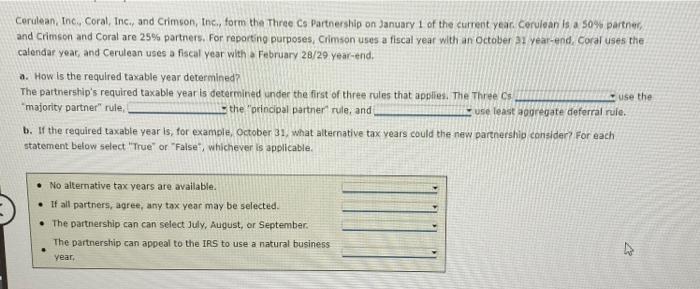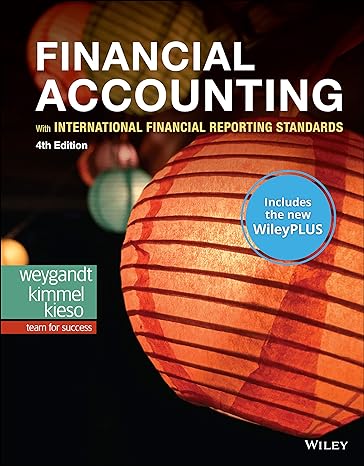Answered step by step
Verified Expert Solution
Question
1 Approved Answer
Please answer both parts Part A options are (can/cannot) Part B options are (true/false) Cerulean, Inc. Coral, Inc., and Crimson, Inc., form the Three Cs
Please answer both parts 
Cerulean, Inc. Coral, Inc., and Crimson, Inc., form the Three Cs Partnership on January 1 of the current year. Cerulean is a 50% partner and Crimson and Coral are 25% partners. For reporting purposes, Crimson uses a fiscal year with an October 21 year-end, Coral uses the calendar year and Cerulean uses a fiscal year with a February 28/29 year-end. a. How is the required taxable year determined? The partnership's required taxable year is determined under the first of three rules that applies. The Three C use the "majority partner" rule the principal partner rule, and use least aggregate deferral rule. b. If the required taxable year is, for example, October 31, what alternative tax years could the new partnership consider? For each statement below select "True" or "false", whichever is applicable. No alternative tax years are available. If all partners, agree, any tax year may be selected. The partnership can can select July, August, or September The partnership can appeal to the IRS to use a natural business Year Cerulean, Inc. Coral, Inc., and Crimson, Inc., form the Three Cs Partnership on January 1 of the current year. Cerulean is a 50% partner and Crimson and Coral are 25% partners. For reporting purposes, Crimson uses a fiscal year with an October 21 year-end, Coral uses the calendar year and Cerulean uses a fiscal year with a February 28/29 year-end. a. How is the required taxable year determined? The partnership's required taxable year is determined under the first of three rules that applies. The Three C use the "majority partner" rule the principal partner rule, and use least aggregate deferral rule. b. If the required taxable year is, for example, October 31, what alternative tax years could the new partnership consider? For each statement below select "True" or "false", whichever is applicable. No alternative tax years are available. If all partners, agree, any tax year may be selected. The partnership can can select July, August, or September The partnership can appeal to the IRS to use a natural business Year Part A options are (can/cannot)
Part B options are (true/false)

Step by Step Solution
There are 3 Steps involved in it
Step: 1

Get Instant Access to Expert-Tailored Solutions
See step-by-step solutions with expert insights and AI powered tools for academic success
Step: 2

Step: 3

Ace Your Homework with AI
Get the answers you need in no time with our AI-driven, step-by-step assistance
Get Started


